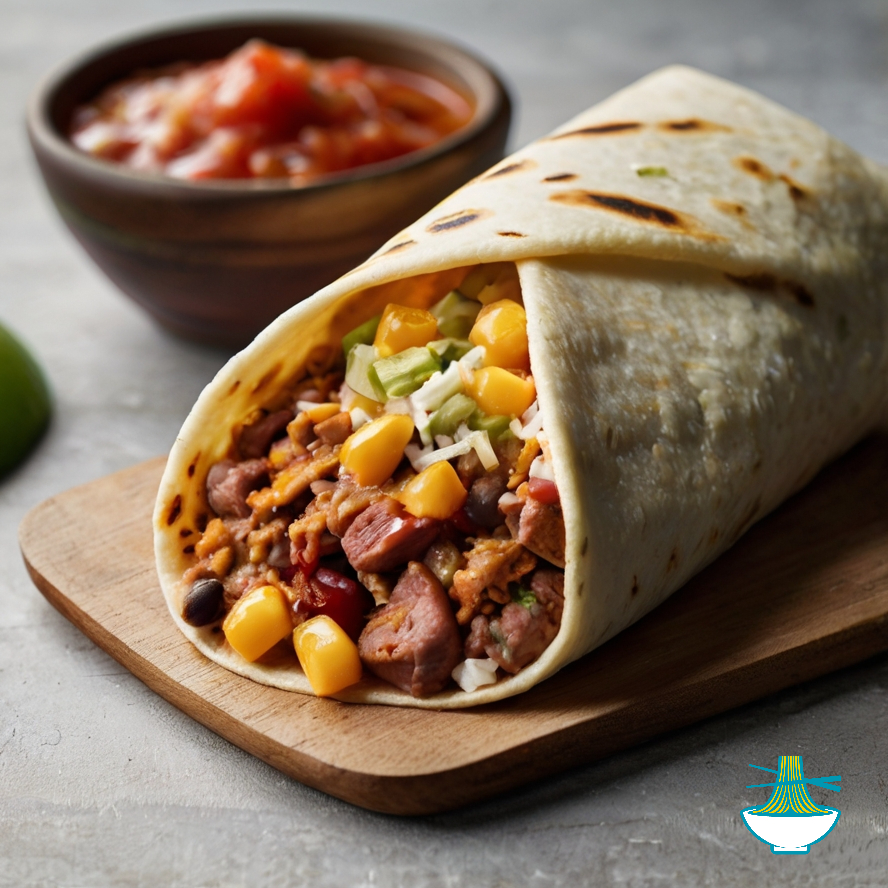The burrito is a beloved Mexican dish that has gained popularity worldwide. It consists of a large flour tortilla filled with a delicious combination of ingredients such as beans, rice, meat (like beef or chicken), cheese, and salsa. The origins of the burrito can be traced back to Mexico, where it emerged as a convenient and flavorful way to enjoy a complete meal on the go. Over time, different regions and cultures have put their own spin on the burrito, leading to a variety of fillings and styles. Today, it's a staple in Mexican cuisine and a favorite choice for a satisfying and portable meal.
Ingredients:
- Large flour tortillas
- Canned or cooked beans (such as black beans or pinto beans)
- Cooked rice (white or brown)
- Cooked and seasoned meat (beef, chicken, or your preferred protein)
- Grated cheese (cheddar, Monterey Jack, or a blend)
- Salsa (store-bought or homemade)
- Optional: chopped onions, sliced jalapeños, sour cream, guacamole
Method of Preparation:
1. Warm the flour tortillas in a microwave or on a skillet until they are pliable.
2. Lay out each tortilla and spread a layer of beans down the center.
3. Add a portion of cooked rice on top of the beans.
4. Place the cooked and seasoned meat on top of the rice.
5. Sprinkle grated cheese over the meat.
6. Add a spoonful of salsa along the center of the filling.
7. Optional: Add chopped onions, sliced jalapeños, sour cream, or guacamole.
8. Fold the sides of the tortilla over the filling, then roll it tightly to form a burrito.
9. Heat a skillet over medium heat and place the burritos seam-side down to seal them.
10. Cook until the tortilla is golden and crispy on all sides, about 2-3 minutes per side.
11. Serve hot with additional salsa, sour cream, or guacamole on the side if desired. Enjoy your homemade Mexican burritos!
Nutrition Value:
1. Large Flour Tortillas:
- Calories: Around 200-250 calories per tortilla (depending on size and brand)
- Carbohydrates: Approximately 35-40 grams
- Protein: About 4-6 grams
- Fat: 3-5 grams
- Sodium: Varies but typically around 300-400 milligrams
- Cholesterol: Usually low, around 0-5 milligrams
- Nutritional Benefit: Provides energy from carbohydrates and a small amount of protein. Depending on the type of flour used, it may also offer some fiber and micronutrients.
2. Canned or Cooked Beans (e.g., black beans or pinto beans):
- Calories: Approximately 100-150 calories per half-cup serving
- Carbohydrates: Around 20-30 grams
- Protein: About 7-9 grams
- Fat: 0-2 grams
- Sodium: Varies, but canned beans may have added salt
- Cholesterol: Typically zero
- Nutritional Benefit: High in fiber, protein, and various vitamins and minerals like iron, potassium, and folate. They contribute to heart health, digestion, and overall nutrient intake.
3. Cooked Rice (White or Brown):
- Calories: Around 200 calories per cup (cooked)
- Carbohydrates: Approximately 45-50 grams
- Protein: About 4-5 grams
- Fat: 0-1 gram
- Sodium: Minimal
- Cholesterol: None
- Nutritional Benefit: A good source of energy from complex carbohydrates. Brown rice is higher in fiber, vitamins, and minerals compared to white rice.
4. Cooked and Seasoned Meat (e.g., beef, chicken, or preferred protein):
- Calories: Varies based on type and portion size (roughly 150-250 calories per serving)
- Carbohydrates: Negligible
- Protein: Approximately 20-30 grams per 3-4 ounce serving
- Fat: Varies based on lean/fat content
- Sodium: Depends on seasoning
- Cholesterol: Amount varies (lean cuts of meat have less cholesterol)
- Nutritional Benefit: Provides high-quality protein, essential amino acids, and various vitamins and minerals like iron, zinc, and B vitamins. Lean cuts offer protein without excessive fat.
5. Grated Cheese (e.g., cheddar, Monterey Jack, or blend):
- Calories: Around 100-120 calories per ounce (28 grams)
- Carbohydrates: Less than 1 gram
- Protein: About 6-7 grams
- Fat: 7-9 grams
- Sodium: Approximately 150-200 milligrams
- Cholesterol: Around 25-30 milligrams
- Nutritional Benefit: Good source of calcium, protein, and vitamin D. However, it's also high in saturated fat and sodium, so moderation is key.
6. Salsa (store-bought or homemade):
- Calories: Varies based on ingredients (roughly 10-20 calories per tablespoon)
- Carbohydrates: Around 2-4 grams per tablespoon
- Protein: Negligible
- Fat: Negligible
- Sodium: Depends on recipe or brand
- Cholesterol: None
- Nutritional Benefit: Generally low in calories and fat. Provides flavor and can contribute to vegetable intake, offering vitamins, minerals, and antioxidants.
7. Optional Ingredients (chopped onions, sliced jalapeños, sour cream, guacamole):
- Calories: Varies based on amount and type (e.g., avocado in guacamole adds more calories)
- Carbohydrates, Protein, Fat, Sodium, Cholesterol: Depends on specific ingredient and portion size
- Nutritional Benefit: Onions provide fiber, vitamins, and antioxidants. Jalapeños can add spice and small amounts of vitamins A and C. Sour cream and guacamole offer healthy fats, vitamins, and minerals (like vitamin K and potassium) but should be consumed in moderation due to calorie content.
It's important to note that actual nutritional values can vary based on brands, cooking methods, and portion sizes.


Comments